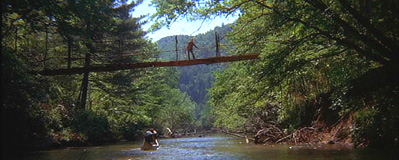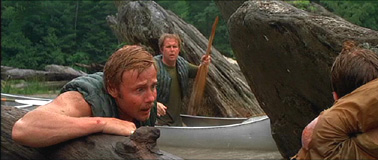|
Newest Reviews:
New Movies -
The Tunnel
V/H/S
The Tall Man
Mama Africa
Detention
Brake
Ted
Tomboy
Brownian Movement
Last Ride
[Rec]≥: Genesis
Hara-Kiri: Death of a Samurai
Indie Game: The Movie
Abraham Lincoln: Vampire Hunter
Old Movies -
Touki Bouki: The Journey of the Hyena
Drums Along the Mohawk
The Chase
The Heiress
Show
People
The Strange Affair of Uncle Harry
Pitfall
Driftwood
Miracle Mile
The Great Flamarion
Dark Habits
Archives -
Recap: 2000,
2001, 2002,
2003, 2004
, 2005, 2006,
2007 , 2008
, 2009 ,
2010 , 2011 ,
2012
All reviews alphabetically
All reviews by star rating
All reviews by release year
Masterpieces
Screening Log
Links
FAQ
E-mail me
HOME
| |
Deliverance (John Boorman, 1972)
 The domineering air of macho aggression that fuels so much
of John Boormanís Deliverance often
recedes into the background to allow a more ruminative mood to rise up, but the
two tones never really meet to form the grand statement that seems to be lurking
somewhere behind the violent outbursts and painterly nature photography that
leave the strongest impressions. Much of the problem lies with the movieís
script, which strains to deliver more than the average action film, but remains
too doggedly faithful to the demands of the genre to transcend it. The Heart
of Darkness-inspired downriver descent to Hell gives the movie a clean
narrative line to follow with ample opportunities for suspense (though the
land-locked final scenes oddly feel the most adrift and aimless), but the
generally lousy dialogue is so blunt in spelling out the filmís Big Themes
that it raises the suspicion of pretentiousness and causes the believability of
the situation to falter. Perhaps, though, itís the castís fault for not
better delivering the lines they were given. The start of the film uses
relatively few close-ups by Hollywood standards, and as a result the characters
seem a bit distanced from the viewer. When a catastrophic trauma forces audience
identification and introduces chaos into the mix about forty minutes into the
movie, the cameraís style changes, bringing the audience closer to the
protagonists, but the actors remain a bit aloof. For example, thereís a key
scene where the men assume a feral position, frantically digging a hole with
their hands, but it doesnít work as well as it should because the required
intensity from the cast just isnít present.
The domineering air of macho aggression that fuels so much
of John Boormanís Deliverance often
recedes into the background to allow a more ruminative mood to rise up, but the
two tones never really meet to form the grand statement that seems to be lurking
somewhere behind the violent outbursts and painterly nature photography that
leave the strongest impressions. Much of the problem lies with the movieís
script, which strains to deliver more than the average action film, but remains
too doggedly faithful to the demands of the genre to transcend it. The Heart
of Darkness-inspired downriver descent to Hell gives the movie a clean
narrative line to follow with ample opportunities for suspense (though the
land-locked final scenes oddly feel the most adrift and aimless), but the
generally lousy dialogue is so blunt in spelling out the filmís Big Themes
that it raises the suspicion of pretentiousness and causes the believability of
the situation to falter. Perhaps, though, itís the castís fault for not
better delivering the lines they were given. The start of the film uses
relatively few close-ups by Hollywood standards, and as a result the characters
seem a bit distanced from the viewer. When a catastrophic trauma forces audience
identification and introduces chaos into the mix about forty minutes into the
movie, the cameraís style changes, bringing the audience closer to the
protagonists, but the actors remain a bit aloof. For example, thereís a key
scene where the men assume a feral position, frantically digging a hole with
their hands, but it doesnít work as well as it should because the required
intensity from the cast just isnít present.
 The times when Deliverance
really comes alive are when the actors shut up and the action takes over, which
fortunately happens quite often. Boormanís numerous set pieces each are
extremely well-directed, and each of them has an imminent sense of danger that
adds to the increasing sense of unease that dots the treacherous journey
downstream. The famous dueling-banjos sequence near the filmís start seems to
preface Spielbergís finale in Close
Encounters of the Third Kind in the way that it uses music to momentarily
connect the characters with what is, for all intents and purposes, an alien life
form. Since the sequence comes at the start of the film, instead of as a payoff
thatís been calculated to obliterate most of the audienceís fear, the brief
flirtation with communicativeness ensures that as soon as the scene ends the
verbal and cultural gaps that exist between these two societies become more
pronounced. The inscrutable temperaments of the rednecks that populate the
natural world of Deliverance reflect
the filmís attitude toward nature itself. At one point Burt Reynoldís
character makes a remark that, ďYou don't beat this river.Ē In a less astute film, such a statement might be mistaken for
wisdom. Here the proclamation seems to suggest his, and modern manís,
pomposity in thinking nature is something that can even be defined as
conquerable or unconquerable. The raging rapids that the men canoe down are so
wildly unknowable that even an admission of their wildness seems too much a
definition for comfort. Itís all the more unfortunate then, that given Deliveranceís
high level of perception when looking at manís relationship with his
environment, no one had the good sense to eliminate its excessive thematic
baggage. In comparison to its look at nature, its inspections of religion,
camaraderie, and society come up short.
The times when Deliverance
really comes alive are when the actors shut up and the action takes over, which
fortunately happens quite often. Boormanís numerous set pieces each are
extremely well-directed, and each of them has an imminent sense of danger that
adds to the increasing sense of unease that dots the treacherous journey
downstream. The famous dueling-banjos sequence near the filmís start seems to
preface Spielbergís finale in Close
Encounters of the Third Kind in the way that it uses music to momentarily
connect the characters with what is, for all intents and purposes, an alien life
form. Since the sequence comes at the start of the film, instead of as a payoff
thatís been calculated to obliterate most of the audienceís fear, the brief
flirtation with communicativeness ensures that as soon as the scene ends the
verbal and cultural gaps that exist between these two societies become more
pronounced. The inscrutable temperaments of the rednecks that populate the
natural world of Deliverance reflect
the filmís attitude toward nature itself. At one point Burt Reynoldís
character makes a remark that, ďYou don't beat this river.Ē In a less astute film, such a statement might be mistaken for
wisdom. Here the proclamation seems to suggest his, and modern manís,
pomposity in thinking nature is something that can even be defined as
conquerable or unconquerable. The raging rapids that the men canoe down are so
wildly unknowable that even an admission of their wildness seems too much a
definition for comfort. Itís all the more unfortunate then, that given Deliveranceís
high level of perception when looking at manís relationship with his
environment, no one had the good sense to eliminate its excessive thematic
baggage. In comparison to its look at nature, its inspections of religion,
camaraderie, and society come up short.
* * *
11-27-02
Jeremy Heilman
|